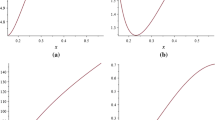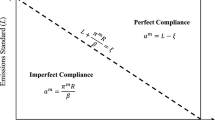Abstract
This paper explores a differential game between a policy maker and a profit maximizing entrepreneur in which production generates pollution. The government levies a pollution tax on output and uses the tax received for pollution abatement. The entrepreneur determines the level of output. A feedback Nash equilibrium is derived. Using more specific functional forms, the game is extended to cover the multiple firm case.
Similar content being viewed by others
References
R.C. d'Arge and K.C. Kogiku, Economic growth and environment, Rev. Econ. Studies 40(1972)61–78.
C.G. Plourde, A model of waste accumulation and disposal, Can. J. Econ. 5(1972)119–125.
R. Luski, A model of recycling and pollution control, Can. J. Econ. 9(1976)91–101.
Dasgupta, Environmental management under uncertainty, in:Explorations in Natural Resource Economics, ed. V.K. Smith and J.V. Krutilla (Johns Hopkins University Press, Baltimore, MD, 1982).
C.G. Plourde and D. Yeung, A model of industrial pollution in a stochastic environment, J. Environ. Econ. Manag. 16(1989)9–105.
B.A. Forster, On a one-state variable optimal control problem — Consumption-pollution trade-offs, in:Applications of Control Theory to Economic Analysis, ed. S.J. Turnovsky (North-Holland, New York, 1977).
W.T. Lin, The control of environmental pollution and optimal investment and employment decisions, Opt. Control Appl. Meth. 8(1987)21–36.
W.S. Misiolek, Pollution control through price incentives: the role of rent seeding costs in monopoly markets, J. Environ. Econ. Manag. 15(1988)1–8.
D.A. Yao, Strategic responses to automobile emissions control: a game-theoretic analysis, J. Environ. Econ. Manag. 15(1988)419–438.
S.R. Millerman and R. Prince, Firm incentives to promote technological change in pollution control, J. Environ. Econ. Manag. 17(1989)247–265.
A. Bensoussan, E.G. Hurst, Jr. and B. Naslund,Management Applications of Modern Control Theory (North-Holland, Amsterdam, 1974).
B. Commoner,The Closing Circle (Jonathan Cape, 1972).
E. Dockner, G. Feichtinger and S. Jorgensen, Tractable classes of nonzero-sum open-loop Nash differential games: theory and examples, J. Optim. Theory Appl. 45(1985)179–187.
C. Fershtman, Identification of classes of differential games for which the open-loop is a degenerate feedback Nash equilibrium, J. Optim. Theory Appl. 55(1987)217–231.
A.A. Cournot,Researches into Mathematical Principles of the Theory of Wealth, translated by Nathaniel T. Bacon (with an essay on Cournot and mathematical economics and a bibliography of mathematical economics by Irving Fisher) (Macmillan, New York, 1927).
J.W. Friedman,Game Theory with Applications to Economics (Oxford University Press, 1986).
T. Basar and G.J. Olsder,Dynamic Noncooperative Game Theory (Academic Press, New York, 1982).
A. Mehlman,Applied Differential Games (Plenum, 1988).
G. Feichtinger and S. Jorgensen, Differential game models in management science, Eur. J. Oper. Res. 14(1983)137–155.
W.M. Flemming and R.W. Richel,Deterministic and stochastic Optimal Control (Springer, New York, 1975).
H. Stalford and G. Leitmann, Suffiency conditions for Nash equilibrium inN -person differential games, in:Topics in Differential Games, ed. A. Blacquière (North-Holland, New York, 1973).
R.F. Hartl, The control of environmental pollution and optimal investment and employment decisions. A comment, Optim. Control Appl. Meth. 9(1988)337–339.
Author information
Authors and Affiliations
Rights and permissions
About this article
Cite this article
Yeung, D. A differential game of industrial pollution management. Ann Oper Res 37, 297–311 (1992). https://doi.org/10.1007/BF02071062
Issue Date:
DOI: https://doi.org/10.1007/BF02071062




